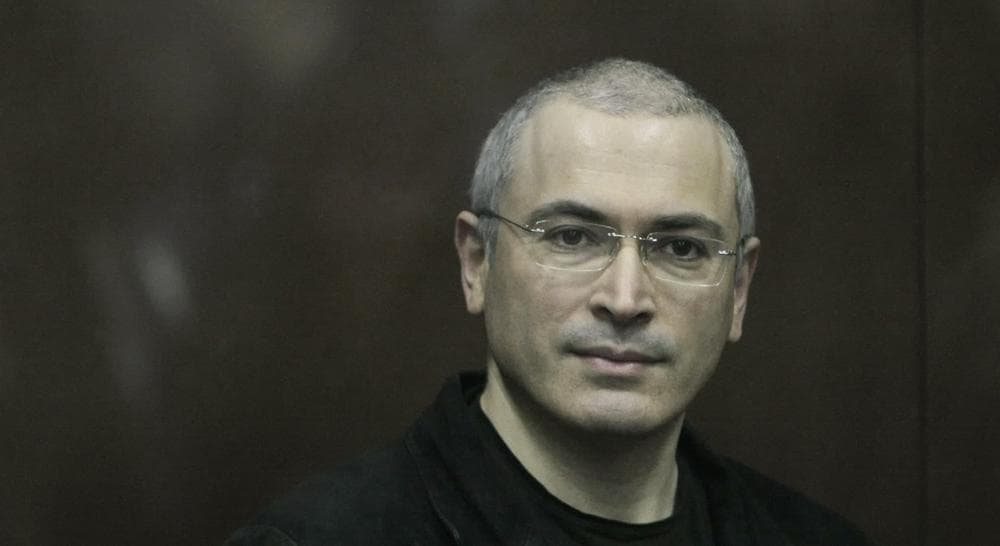Advertisement
A Move Straight Out Of The Cold War Playbook
It is always welcome news when people who have been unjustly imprisoned gain their freedom. So our initial response to the startling news out of Russia that a number of high-profile prisoners will soon be released should be one of celebration. The imprisoned oligarch Mikhail Khodorkovsky, Nadezhda Tolokonnikova and Maria Alyokhina of the punk rock collective Pussy Riot, and the 30 Greenpeace activists who were arrested in September during their protest in the Arctic waters will be among those released.
Observers have been quick to point out that with the Winter Olympics set to open in Sochi this February and with the specter of Russia’s anti-gay legislation looming over the Games, it only makes sense for Russian President Vladimir Putin to defuse at least some of the troubling questions about human rights in the Russian Federation today. Khodorkovsky, who made his fortune building up the Yukos oil company into one of Russia’s largest before he was arrested in 2003 on complicated tax and fraud-related charges, has probably become the most famous political prisoner in the world today. By the time of his second trial in December 2010, human rights groups like Amnesty International were willing to recognize him as a prisoner of conscience and to call for his unconditional release. It is widely assumed that what got Khodorkovsky into trouble in the first place was his willingness to challenge the Kremlin over how another state-run oil company was muscling in to take over Yukos. This compounded his vulnerability as one of the few wealthy people in Russia to support opposition political parties after Putin made clear that the oligarchs would be wise to stay clear of politics.

There is a long and not so honorable tradition of Russian rulers releasing their prisoners on purely arbitrary grounds. After Stalin died, his heirs ordered the release of nearly a million prisoners within weeks after his death, almost all of whom had faced genuinely criminal charges; the political prisoners had to wait many additional months before their cases were properly reviewed. Under Leonid Brezhnev, there were several high-profile prisoner exchanges: the human rights activist Vladimir Bukovsky for the Chilean communist leader Luis Corvalan in December 1976. Bukovsky was quick to point out that “It had happened in the past that two hostile countries had exchanged foreign spies they caught or prisoners of war. But to exchange your own citizens — I had never heard of that before.” And in April 1979 the Kremlin exchanged a group of five imprisoned dissidents for convicted Soviet spies in American jails.
Putin’s Russia, for all its authoritarian habits, is a far cry from the Soviet era. An openly opposition press operates in Russia today, albeit under severe pressure and the threat of violence from unknown assailants. The internet gives people access to unfettered news and opinion from both domestic and foreign sources. Religious groups — with some notable exceptions — can meet freely, educate their children, and offer social welfare assistance without official interference. The borders are open to Russian citizens who wish to travel for business or pleasure.
There is a long and not so honorable tradition of Russian rulers releasing their prisoners on purely arbitrary grounds.
But the releases we are celebrating today do not embody respect for the rule of law. They are the result of a calculated strategy by a government that chooses whom to arrest and when, and then when and how to release these same people based on criteria that are extraneous to the requirements of a properly functioning judicial system.
Meanwhile, many other people in Moscow continue to face charges in connection with the large demonstration that took place on the eve of Putin’s most recent inauguration in May 2012. Human rights groups are convinced that the charges and the long pre-trial detention of a number of activists are totally disproportionate to the pushes and shoving that occurred between some police and some of the demonstrators.
And the Kremlin insists that nongovernmental organizations that receive foreign funding and engage in “political activities” register as “foreign agents” and identify themselves with this description in all their reports. Such amendments to laws that regulate nongovernmental organizations undermine freedom of association and expression. They are designed to compromise the reputation of such groups, to discredit them in the eyes of the broader Russian public. And if a group resists obeying the law, its leaders can be fined and imprisoned.
No amount of high-profile releases of political prisoners should be allowed to obscure the Kremlin’s intention to squeeze civil society, to hamper the work of groups trying to protect the rights of Roma, of gays and lesbians, of political prisoners.
Under pressure from the West, there was a time when the Kremlin learned to use political prisoners or would-be émigrés as bargaining chips, as pawns in a Cold War game. They could be let go to appease a visiting U.S. Senator or a British cabinet officer. But the same question looms today as it did before: Why were these prisoners being held in the first place?
Related:
This program aired on December 23, 2013. The audio for this program is not available.